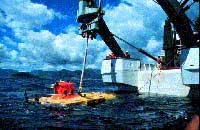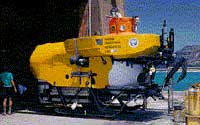
Marine Bioproducts Engineering Center
University of Hawai'i (lead institution) and University of California at Berkeley
![]()
Serving marine bioresources science and industry in America
| A National Science Foundation Engineering Research Center since 1998 |
Marine environments are host to a wide range of bioresources that have tremendous potential to provide new bioproducts, including enzymes, antibiotics, anticancer agents, food additives, and pigments. The Marine Bioproducts Engineering Center (MarBEC) is building a foundation of applied research, education, and technology transfer to support a marine biotechnology industry of increasing commercial and national importance. MarBEC's systems focus integrates product discovery and technology development for large-scale cultivation of marine microorganisms and processing of these products. The Center provides unique opportunities for exploration of the marine environment and new approaches to prototype production systems. It is training graduate and undergraduate engineering and life science students to become the next-generation leaders in industry and academia in this field.
Marine biotechnology finds application in almost every major industry, including food, chemicals, pharmaceuticals, advanced materials, energy, environment, and national defense. As a consequence, this nascent industry is growing rapidly in importance to the nation and world. MarBEC supports this growth through collaborative activities designed to advance:
- product discovery from a wide range of bioresources
- development of efficient production systems
- downstream processing and delivery of useful bioproducts.
The exploitation of new marine bioproducts will require scientists and engineers with backgrounds in marine science. The education of chemical engineering, ocean engineering, and biology students in marine biotechnology is a major component of MarBEC. These students will be the new professionals entering the emerging marine biotechnology industry.
MarBEC is a partnership between the University of Hawai'i at Manoa and the University of California at Berkeley. Its collaborators include leading laboratories, research centers, and universities in the U.S. and the Asia-Pacific region.
Research
MarBEC integrates research advances in the chemistry of marine natural products, cultivation of microalgae, and processing of bioproducts to create systems capable of successful commercial production of marine bioproducts. MarBEC is based on a systems approach that links multi-disciplinary science and engineering teams in each stage of bioproduct development. The research program has three major thrusts: discovery and identification of bioresources, development of production systems, and downstream processing of bioproducts.
 |
| Coconut Island in Oahu's Kaneohe Bay is the site of the new Edwin W. Pauley Marine Laboratory that is being used by MarBEC researchers to isolate and identify marine bioresources. |
Bioresources
Marine microorganisms and other species have evolved unique physiologies and biochemical pathways that generate many bioactive chemical compounds. Research at MarBEC seeks first to overcome the engineering challenge of locating, acquiring and cultivating these organisms, some of which inhabit extreme environments, and second to apply technologies such as combinatorial chemistry and biocatalysis to generate novel bioproducts and lead compounds of interest to industry.
Through the University of Hawai'i, MarBEC has access to extensive collections of marine microbes, which are being screened for new bioproducts. The University of Hawai'i's ocean research vessels and deep ocean submersibles will be used to acquire microorganisms and other bioresources from extreme environments such as those at Lo'ihi, an undersea volcano located off the east coast of the Big Island.
Bioproduct classes under investigation include carotenoids, poly-unsaturated fatty acids (PUFAs), enzymes and UV-absorbing agents. Bioproducts in some of these classes are already under commercial development; MarBEC will modify the organisms involved through metabolic engineering and enhance yields by improving photobioreactor performance, and develop new means to purify, stabilize, and formulate these bioproducts.
Production Systems
Because it is impractical to collect vast numbers of marine organisms to obtain a few milligrams of bioproduct, MarBEC is researching a variety of bioreactors suitable for commercial propagation of marine organisms. These include: photobioreactors capable of supporting high concentrations of microorganisms for production of pharmaceutical products; open and closed photobioreactors of various designs and scales for microalgal cultivation; high-pressure, high-temperature bioreactors for cultivation of extremophiles; and bioreactors for growth of bacteria and fungi under conditions which reflect the marine environment.
 |
| The R/V Kaimikai-O-Kanaloa is the mothership for the Pisces V submersible. The vessel has accommodations for 10 scientists and a range of 15,000 nautical miles or 50 days. This ship will allow MarBEC researchers to access remote ocean locations throughout the Pacific. |
Downstream Processing
Many products of interest to MarBEC are prone to chemical, thermal, or photooxidative damage. MarBEC must therefore develop technologies to economically extract, purify and stabilize target products. MarBEC's research will develop and enhance separation technologies for dewatering microalgae, and for extracting and purifying marine bioproducts. MarBEC researchers are also studying the effects of temperature, light, humidity, time, packaging, and other conditions to understand the physicochemical bases for rational product formulation. The stabilization of marine products for industrial and healthcare use requires they utilize the most appropriate delivery systems. The findings will be cataloged to provide industry with the most up-to-date information possible to prepare stable, effective bioproducts for consumers.
Education
MarBEC's education program trains next-generation marine biotechnology engineers at the undergraduate, graduate, and post-graduate levels. It is developing new curricula at the University of Hawai'i and University of California at Berkeley that emphasize marine bioresources. Marine biologists will be exposed to issues related to commercial production. In addition, the program will stimulate interest in biotechnology through educational outreach in high schools, colleges, and businesses. The Sea Grant College programs at the partner universities provide established channels such as public workshops and forums where MarBEC shares exciting research discoveries and developments in marine biotechnology.
Industrial Collaboration and Technology Transfer
 |
| The Pisces V is a 3-man, 2000-meter rated submersible operated by the Hawai'i Undersea Research Lab. MarBEC researchers use the submersible to visit Loihi, an active submarine volcano off the island of Hawai'i, and other remote environments on the seafloor and in the water column. |
The common thread woven through the MarBEC program is the merging of the intellectual with the pragmatic. To effectively translate research advances into commercial products and processes, collaboration with industry is vital. MarBEC is establishing relationships with firms in a range of industries, including chemicals, pharmaceuticals, advanced materials, food, feed, energy, environment, cosmetics, and aquaculture. Partnerships with industries in Hawai'i, the U.S. mainland, Asia, and Europe are being formed. These partnerships incorporate interactive exchanges, workshops, symposia, and cooperative research.
Collaboration and information sharing are the basis of MarBEC's support for its partners in commerce and industry. MarBEC's Industrial Advisory Board assists with program and research planning, and MarBEC's industrial sponsors participate in specific research programs and projects. The result is mutually beneficial partnerships that stimulate research with marketable applications.
MarBEC provides preferred licensing arrangements with participating industrial sponsors, as well as opportunities to interact closely with faculty and students at research meetings and symposia. Industrial sponsors will also have the opportunity to participate in the growth of MarBEC's research and education programs in the marine biotechnology arena.
![]()
Center Headquarters
Marine Bioproducts Engineering Center
University of Hawai'i at Manoa
2525 Correa Road, HIG 131
Honolulu, HI 96822-2219
Tel (808) 956-7385 · Fax (808) 956-5308
Homepage: http://www.marbec.net
Center Director: Dr. Alexander Malahoff
Administrative Director: Ms. Judy Rubano
Director of Business Development: Mr. Kevin Kelly
Director of Operations: Ms. Kathy Oshiro
e-Director: Mr. David Kimball
Marine Bioproducts Engineering Center
University of California at Berkeley
201 Gilman Hall
Berkeley, CA 94720-1462
Tel (510) 643-7255 · Fax (510) 643-1228
Associate Director: Dr. Harvey Blanch
Managing Director: Ms. Stacey Shulman
NSF 00-137c